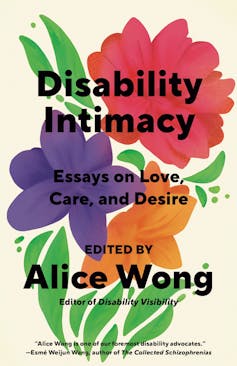Alice Wong recently won a MacArthur genius grant. Her latest book, Disability Intimacy, is about more than sex
- Written by Amanda Tink, Postdoctoral Research Fellow, University of South Australia

“In the United States, we’re taught that nakedness is a very intimate and private thing. Yet, I have to show people my body every day to receive the assistance I need,” writes Ashley Volion, a wheelchair-using disability rights activist, in Disability Intimacy. “I have to be vulnerable in ways that other people wouldn’t even dream of. Intimacy means something deeper.”
Her contribution is one of many delightful reminders that Alice Wong’s third (and boldest) anthology is anchored in authentic experiences of disabled people and intimacy, rather than stereotypes.
Disabled editor Wong, who won a prestigious MacArthur Foundation genius grant, worth US$800,000, last year, has long been interested in this kind of representation. She has had muscular dystrophy “my entire life” and founded the Disability Visibility project just over a decade ago, in 2014.
Review: Disability Intimacy: Essays on Love, Care and Desire – edited by Alice Wong (Knopf)
An oral history project designed to share the stories of disabled people through interviewing each other, it grew to encompass a podcast, a blog, social media, arts projects, and spaces for connection and community building – and three anthologies of disabled people’s experiences. Her work centres disabled people’s perspectives around topics such as opioid addiction, sexual abuse, mental health, economic insecurity, and education.



















